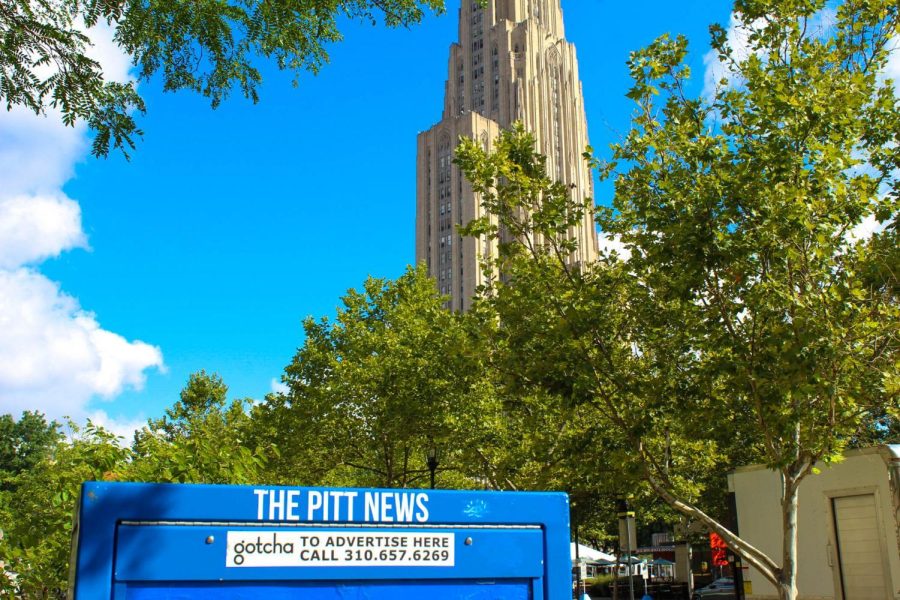First-generation students work to make best of fall semester, despite pandemic
Photos courtesy of Yangkai Zhang, Jaden Calhoun and Nikolai Czepiel
Yangkai Zhang, left, Jaden Calhoun, center, and Nikolai Czepiel (left, right) are first-generation college students attending Pitt.
November 18, 2020
Jaden Calhoun and many other first-generation college students grew up with a different idea of college compared to their peers. Calhoun said she didn’t really know what college was until teachers started pushing her to prepare for college in high school.
“I really didn’t know what college was until about 9th grade, when the teachers I had started talking about what we needed to do to prepare for college,” Calhoun, a first-year media and professional communication major, said. “But before that, I just thought that we go to college if we want to be a doctor, lawyer or a teacher.”
Without the same background knowledge of college that their peers may have, first-generation college students face distinct challenges, such as the college application process, financial difficulties and the adjustment to college life. In order to help first-generation students transition, Josie Rush, a teaching consultant at the University Center for Teaching and Learning, said the center holds “diversity, equity and inclusion training for faculty and staff that incorporates the first-generation identity.”
The center hosted a Zoom workshop titled “New to School: Supporting First-Generation Students” on Tuesday for Pitt faculty and staff to discuss the challenges of first-generation students during COVID-19 and help find ways to support the students in their education.
Rush, one of the workshop’s facilitators, said while higher education is presented as an engine of social mobility, that education is unfortunately difficult to access for most first-generation college students.
“It is unfortunately not surprising considering how frequently first-generation students come from a low-income household,” Rush said. “Unfortunately, the paradox of higher education is that college is often positioned as an escape from financial insecurity, but at the same time, it’s difficult to access and benefit from higher education when one is financially insecure.”
The COVID-19 pandemic is not only influencing first-generation students’ mental health, but also affecting them financially, according to Rush. When the economy began to take a dive at the start of the pandemic, Calhoun said finances became her family’s primary concern.
“My family is just really stressed out,” Calhoun said. “When our jobs opened back up in the middle of a pandemic, we went to work immediately, trying to make up for lost wages.”
Nikolai Czepiel, a first-year linguistics major, said it is already tough being a first-generation college student, and the pandemic is putting an extra layer of difficulties on already strained finances.
“For me, at least, this adds an extra layer of stress. I can’t get sick because I need to stay on campus and can’t get my family sick because we all need the money from our jobs,” Czepiel said. “For people like me, who share my situation, COVID-19 isn’t just a virus — it’s a death sentence. Even if we get it and survive physically, economically we would be destroyed.”
In addition to financial hardships, the pandemic has caused other obstacles for college students. Czepiel said he felt “robbed” of the college experience.
“I have noticed that it’s next to impossible to make friends with people in your classes, which sucks,” Czepiel said.
Yangkai Zhang, a first-generation first-year biology major originally from China, said the lack of the traditional, in-person academic environment is making learning more difficult.
“I think one of the biggest challenges in terms of participating in class during a pandemic is definitely the lack of ‘college experience,’” Zhang said. “In terms of like, going to class in person, meeting with the professor, sitting in a huge lecture hall and studying with friends together in the library, that kind of thing.”
Calhoun said she feels discouraged when compared to others who are also learning remotely.
“My nieces and nephews range from 5 to 17, and they are also doing online school right now, and I feel like I’m comparing them a lot,” Calhoun said. “‘Why can’t you get your work done? My 8-year-old got his work done.’ Versions of that phrase have been said to me multiple times throughout this pandemic.”
Rush said faculty, staff and administration at Pitt must work harder to guarantee first-generation college students know more about the programs, people and policies that are easily accessible for them.
“First-gen students often have to make choices between going to work, caring for family members or attending class, and the pandemic has worsened this situation,” Rush said. “Of course, compounding any issue facing first-generation students right now is the fact that they are more disconnected from University resources.”
According to Rush, Pitt is trying its best to help college students belong to this community, such as through Student Support Services, where participants can work individually with an adviser to develop academic and career plans for the future.
Rush said the facilitators also help first-generation students learn to practice mindfulness, teach study and time management skills and to help first-generation students feel part of the Pitt community. She also said the Pitt community needs to work on supporting first-generation students with opportunities and engagement.
“One of the most important things instructors can do for first-generation students right now is transparently present flexible opportunities for connection and engagement,” Rush said. “We’re happy to work with instructors to effectively engage with this diverse and talented population during a particularly difficult time.”
Zhang said his experience in college as a first-generation first-year college student is “scary,” especially with having limited exposure to what college would be like.
“I’d say it is a great yet scary experience, not knowing what it is really like, but only hearing it from others definitely made it sound more scary than it should,” Zhang said. “In my opinion, it is just like grade school but with more intensive study than teachers actually lecturing.”








